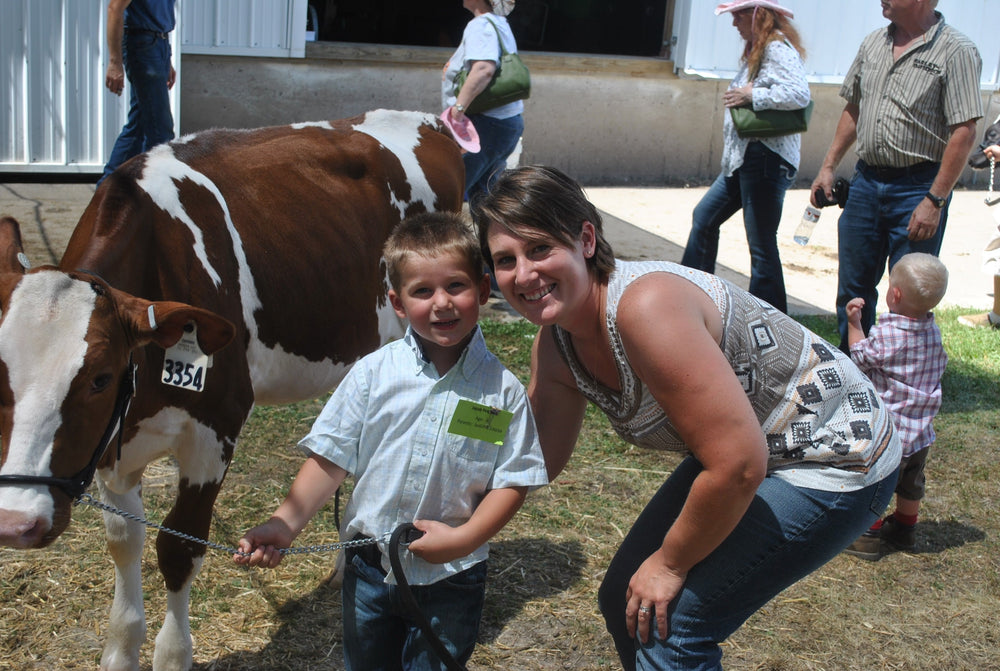
Nunca hubiera esperado aprender lecciones de paternidad de un animal de 1.400 libras, pero aquí estamos.
Resulta que criar terneros y criar niños tienen algunas cosas en común: ambos requieren más bocadillos de lo que crees, ambos ensucian todo a los cinco minutos de limpiar, y ambos ponen a prueba tu paciencia de maneras que desconocías. Durante los últimos 19 años, caminando entre la maternidad y la vida en el campo, me he dado cuenta de que el ganado ha moldeado silenciosamente mi forma de criar, y no solo porque todos estamos aquí antes del amanecer.
Aquí les dejamos algunas de las mejores lecciones que nos ha transmitido nuestra manada.
1. La rutina lo es todo
Al ganado le encanta la rutina. Si les das de comer tarde, te lo harán saber. Si les cambias el corral de repente, actuarán como si les hubieras cambiado la perspectiva. ¿Y los niños? Lo mismo.
La hora de dormir, la hora de comer, las tareas matutinas: estos pequeños rituales anclan nuestros días. Nos ayudan a sentirnos seguros, tranquilos y estables. Claro, todavía tendremos alguna que otra crisis nocturna (ya sea de dos o cuatro patas), pero el ritmo importa más que la perfección.
Si te pierdes una rutina, lo oirás, ya sean mugidos o lloriqueos.
2. Presión suave, aplicada de manera constante
Esta es una vieja frase sobre manejo de ganado que vive en mi cabeza sin pagar alquiler: presión suave, aplicada de manera constante.
Significa que no se mete al novillo en el remolque a la fuerza; se guía con calma y firmeza hasta que entra solo. Resulta que esto también funciona con niños pequeños.
Cuando mantienes un límite firme, sin gritar ni jalar, lo consiguen. Con el tiempo. Puede que necesites redirección (y un refrigerio), pero la presencia constante siempre funciona mejor que el caos. Tanto la crianza como la agricultura recompensan el largo camino.
3. No esperes lo que no te han enseñado
Un ternero no solo sabrá caminar con un cabestro, subirse a la báscula o seguir tu ejemplo. Tienes que enseñárselo. Una y otra vez.
Lo mismo ocurre con los niños. No podemos esperar que simplemente "sepan más" si no hemos caminado con ellos primero. Los buenos modales, la ética laboral, cómo tratar a los animales, cómo tratar a las personas, todo se aprende. Y siempre están observando, incluso cuando pensamos que no.
Suponer que saben más es una forma rápida de frustrar a todos, especialmente a usted mismo.
4. Cada uno es un poco diferente
Aunque se críen en el mismo pasto, con el mismo alimento y la misma cerca, cada animal tiene su propia personalidad. Algunos son audaces y mandones. Otros se quedan atrás. Algunos son lo suficientemente mansos como para soltar el cabestro a las cuatro semanas; otros nunca pierden la fuerza.
Los niños no son diferentes. Lo que le funciona a uno no siempre le funciona al otro. Uno necesita una charla tranquila, el otro necesita dar vueltas por la casa con botas de goma antes de poder escuchar lo que dices. No pasa nada. Ese es el truco.
No existe una solución única para todos, ni para las botas ni para los límites.
5. Alimenta a menudo, ama siempre
No se puede esperar que crezca nada bueno, ni en la granja ni en una familia, si no se alimenta. El ganado necesita alimento y agua constantes, sí, pero también necesita un manejo tranquilo, una cama limpia y que alguien esté pendiente de su bienestar.
Los niños también. Necesitan energía para sus cuerpos y sus corazones. Necesitan refrigerios, claro, pero también necesitan tu presencia, tus ojos puestos en ellos, tus brazos abiertos, tu sí y tu no.
No se puede acortar la conexión. Ni en un granero. Ni en la mesa.
Reflexiones finales: el ganado, los niños y el juego a largo plazo
Criar buenos terneros y buenos niños lleva tiempo. Implica estar presente cuando estás cansado, limpiar lo que no salió según lo planeado y celebrar las pequeñas victorias, como cuando nadie se escapó de la puerta o cuando todos llegaron a la escuela a tiempo con vaqueros limpios (o casi).
Es curioso los lugares en los que puedes encontrar conocimientos sobre paternidad: a veces es un podcast, a veces es un pastizal.
De cualquier manera, estoy agradecido por ambos.



Dejar un comentario
Ver artículo completo
Thawing Big Cuts: How Much Time to Pull from the Freezer
Ever wondered how long it really takes a ham or prime rib to thaw in the fridge? We’ve all been there, staring at a frozen roast two days before dinner. Here’s your guide to safe, slow thawing, including how many days to allow for bone-in versus boneless cuts and when to pull from the freezer so your meal goes off without a hitch.
Plus, a reminder why we only ship frozen, because that’s what keeps your meat safest and freshest.
Ver artículo completo
What’s the Difference Between A1 and A2 Milk
Ever wonder if Creamery Creek milk is A1 or A2? The truth is, it’s a natural blend. Our Holstein herd includes both A1A2 and A2A2 cows, and while we track it through genomic testing, we don’t separate the milk. Here’s what that means and why we care about it.
Ver artículo completo
Behind the Scenes: How Your Order Ships from Our Farm
Ever wonder what happens after you click “Place Order”? Take a peek behind the scenes to see how your Creamery Creek box is packed, shipped, and delivered straight from our family farm with care and attention in every step.
Ver artículo completo